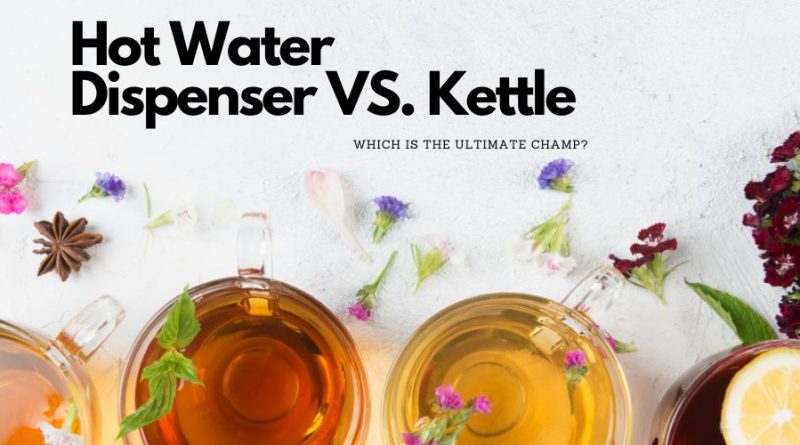Hot Water Dispensers vs. Kettles: Revolutionizing Your Tea Time
Hot water Dispensers vs. Kettles? Which truly is the ultimate champion?
Both options offer a way to quickly heat water for your favorite hot beverages, but which one truly revolutionizes your tea time experience? Let’s dive into the pros and cons of each to help you make an informed decision. Are you tired of waiting for the kettle to boil every time you want a cup of tea? Or perhaps you’re looking for a more compact and space-saving solution? Get ready to explore the world of modern tea brewing as we compare the convenience and functionality of hot water dispensers and kettles.
However, if you sway more towards kettles, make sure to check out our blog post from last year on the Top 5 Energy-Efficient Kettles of 2022.
![Breville HotCup Hot Water Dispenser | 3kW Fast Boil |1.5L | Energy-Efficient | Gloss Black [VKJ142]
Hot Water Dispensers vs. Kettles](https://discountdays.co.uk/wp-content/uploads/2023/07/818fcLS7hGL._AC_SL1500_1-1024x1011.jpg)
What is a Hot Water Dispenser?
Hot water dispensers vs. kettles, essentially are they both the same? Apart from the fact that they are both kitchen appliances, they have a few notable differences. A hot water dispenser is specifically designed to provide instant hot water for various purposes. whereas a kettle takes time to boil.
Unlike a traditional kettle that boils water and requires you to manually pour it, a hot water dispenser dispenses hot water directly into your cup or mug. Usually with the push of a button or lever, eliminating the need to wait for the water to boil.
Furthermore, hot water dispensers often come with adjustable temperature settings. Perfect for coffee lovers in a rush on a Monday morning. Some models also include additional features such as water filters, water level indicators, and safety features like automatic shut-off.
These appliances are suitable for countertop use in kitchens, offices, or other settings. They provide convenience, energy efficiency, and quick access to hot water.
There are several hot water dispensers available in the market, however, one that we have found with many great reviews has been the Breville HotCup Hot Water Dispenser.
Pros of having a hot water dispenser

What is a Kettle?
The main kettle’s function is to boil water quickly and efficiently. Typically, with a heating element at the base. Once switched on, the heating element heats the water inside, bringing it to a boiling point after a period of time.
Furthermore, they are versatile appliances and can also be used besides boiling water for cooking, they can sterilize baby bottles, or prepare instant soups and noodles.
Moreover, kettles often come with additional features such as automatic shut-off when the water reaches boiling point and water level indicators. Some advanced models even have “keep warm” functions to maintain the water at a specific temperature for a certain period.
Kettles such as the Russell Hobbs 26051, are widely popular due to their simplicity, ease of use, also due to their ability to quickly heat water for various needs in the kitchen or household.
Pros of having a Kettle

Which is more truly cost-efficient?
Now, you’re probably wondering which of the two is actually more cost-effective. Well, this comes down to several factors, such as energy usage, water consumption, and upfront costs. Here’s an overview of the cost-effectiveness of each option:
Hot Water Dispenser:
Energy Efficiency: They can be more energy-efficient than kettles because they only heat the amount of water needed at a given time, reducing energy waste.
Continuous Hot Water: Hot water dispensers provide a continuous supply of hot water, reducing energy consumption and minimizing water waste.
Higher Upfront Cost: Initially more expensive, however, if you frequently require hot water throughout the day, the long-term energy savings may offset the higher upfront investment.
Kettle:
Lower Initial Cost: Kettles are typically more affordable compared to hot water dispensers, making them an economical choice for those on a budget.
Quick Boiling Time: Kettles heat water rapidly, which can be advantageous in terms of time efficiency, especially when boiling smaller amounts of water.
Overall, the cost-effectiveness of a hot water dispenser or kettle depends on your specific usage patterns and priorities. If you frequently require hot water in large quantities throughout the day, a hot water dispenser may provide long-term energy savings. However, if you typically boil smaller amounts of water and prioritize lower upfront costs, a kettle may be more cost-effective.
To determine the precise cost-effectiveness for your situation, consider factors such as energy rates, water consumption, and your usage habits. Assessing these factors and comparing the potential energy savings against the initial investment will help you make an informed decision.

Hot Water Dispenser vs. Kettle – what’s the verdict?
The verdict between a hot water dispenser and a kettle ultimately depends on your personal preferences and needs. Here are some factors to consider:
- Convenience: Hot water dispensers offer instant hot water with a push of a button, eliminating the wait time for the water to boil. Kettles, on the other hand, require you to fill them with water and wait for it to heat up. If you value convenience and quick access to hot water, a hot water dispenser may be the better option.
- Customization: Hot water dispensers often have adjustable temperature settings, allowing you to choose the desired water temperature for different beverages. Kettles typically offer a simple on/off switch without temperature control. If you enjoy brewing tea or coffee at specific temperatures, a hot water dispenser gives you more control.
- Cost: Hot water dispensers tend to be more expensive than traditional kettles due to their additional features and convenience. Kettles are generally a more budget-friendly option as an appliance However, a hot water dispenser is a far more energy-efficient and cost-effective way to get near-boiling water over an extended period than a kettle.
Ultimately, the choice between a hot water dispenser and a kettle depends on your priorities and lifestyle. If instant hot water, temperature control, and cost-effectiveness are important to you, a hot water dispenser might be worth considering. If versatility, space efficiency, and the ability to use the appliance for various cooking tasks are your priorities, a kettle may be the better choice.
Please note, as an Amazon Associate we earn from qualifying purchases – links from other sites is subject to affiliated links which may or may not pay commission in specific circumstances.




Pingback: Kitchen Upgrade: Revamp Your Space With The 5 Must-Haves